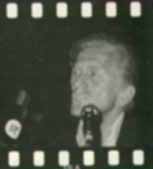
Kirk Douglas: "Reclaimed faith", Oct. 11th, 1997

Actor Kirk Douglas embraces his long-neglected Jewish heritage
He used to be known as Hollywood's ``Jewish goy,'' a Jew so Nordic-looking he could, as they say, pass. For decades, Kirk Douglas, nee Issur Danielovitch, wasn't one to go out of his way to correct the record.
Douglas' one concession to observing Yom Kippur, the holiest day in the Jewish calendar, was to fast - while he was at work, that is. You could almost hear Douglas' stomach rumble when he made love to Lana Turner in ``The Bad and the Beautiful.''
But these days Douglas doesn't observe the ewish High Holidays incognito. You wouldn't figure Spartacus to be donning a yarmulke instead of a loincloth? Obviously, you don't see what Rabbi Nachum Braverman sees.
``He said, `Kirk, I think you like being Jewish because it's so dramatic,''' Douglas says of his Talmudic teacher in Los Angeles. ``I said, `You know, you have a point. To be a Jew, to be persecuted all over the world, to have been slaves in Egypt, you must admit it is dramatic.'''
The Hollywood icon is so convinced of Judaism's theatrical appeal that when University of Southern California film students asked for his tips on screenwriting, he suggested they study the greatest script of all: the Bible.
``If you look back in movie history, so many stories were based on the Bible,'' he says. Even his son Michael's movie ``Disclosure''? Check out the story of Joseph and Potiphar, the wife of Joseph's master.
But it wasn't the possibility of more film projects that inspired Douglas to crack open the greatest story ever told. He embraced his religious roots after a midair collision six years ago that left him alive and two younger men dead. His search for an expla- nation culminated in his latest memoir, ``Climbing the Mountain: My Search for Meaning''.
Which is why he is here now in his art-filled Beverly Hills living room, sharing the answers he found. Because after years of contemplation, Douglas concluded that God let him live so he could come to terms with his Jewish heritage. And that involved helping other people by offering his hard-earned lessons. With him is his editor and close friend Uriela Obst, who converted to Judaism as she helped Douglas research his fourth book and second memoir.
In addition to offering spiritual epiphanies, the '90s also have brought him fierce battles with severe back pain as well as the anguish of learning to speak again after his stroke a couple of years ago. Neither stop Douglas from chatting engagingly about his recent voyage with humor and surprising humility.
In his chatty yet moving book, the tracks of Douglas' struggle are poignantly clear: ``Does God love nature more than man? Have you ever seen an ugly landscape? Never! ... Maybe it's because nature accepts whatever God gives -- without complaining -- that God seems to love nature more. I need your love, God. Help me to be like a tree. ...''
The crash happened Feb. 13, 1991, when the helicopter he was in collided with a small plane 50 feet above the Santa Paula airport northwest of Los Angeles. The men in the plane, U.S. aerobatics champion Lee Manelski, 46, and his student, David Tomlinson, 18, died.
Douglas suffered a compressed spine, which knocked him down 3 inches in height, but the deeper wound was to his worldview. He wondered why he had survived when younger men had not. He thanked God for his fate.
``Then I caught myself,'' he writes. ``We all say, `Thank God,' automatically when we have a narrow escape, but do we mean it? I'm not sure I did.
``I hadn't thought about God for a long time. I ran away from him many, many years ago.''
As he lay steeped in pain in his bedroom, he contemplated the series of Marc Chagall biblical prints above his bed. He remem- bered his childhood in Amsterdam, N.Y., where he learned the meaning of the Yiddish expression, ``It's tough to be a Jew.'' The memories of the anti-Semitic tormentors of his youth are what helped him reassess his roots.
In ``Climbing the Mountain,'' Douglas writes sadly of people in Hollywood who have lost their spiritual way in the quest for fame and fortune. And he wonders whether he would have been a better father if he'd embraced his Judaism earlier.
His four sons, he says, identify as Jews even though their mother is not Jewish. And he says his spiritual blossoming has helped draw the family closer than ever.
Indeed, at the ripe age of 80, Douglas seems at least as happy as a younger man at the peak of an Oscar-winning career, and not just because of the chorus line of honors he continues to win.
``Since the crash, since my stroke, I think I have become a better person,'' he says, his blue eyes blazing. ``I have become more giving of myself and what I have.
``So I think that everything happens for a reason. Sometimes you don't know the reason, but there is a reason. Just like I think God answers all prayers, (and) sometimes the answer is no.''